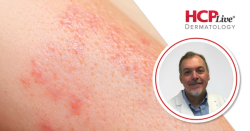
OR WAIT null SECS
Systematic Review Suggests Oral JAK Inhibitors Effective in AD
Oral doses of 3 Janus kinase inhibitors show the therapies out-performed placebo in all outcomes measured in patients with moderate-to-severe AD.
Janus kinase (JAK) inhibitors appear to be effective treatments for patients with atopic dermatitis (AD), according to a new systematic review of 14 randomized controlled trials.
The trials assessed 3 different oral JAK inhibitors, abrocitinib (Cibinqo), baricitinib (Olumiant), and upadacitinib (Rinvoq). The review was published in the journal Skin Health and Disease.
Corresponding author Kevin P. Lee, of the University of Texas at Houston, and colleagues, wrote that many patients with AD are successfully treated with topical therapies like corticosteroids, calcineurin inhibitors, and phosphodiesterase inhibitors.
Non-responders to topical therapy are sometimes treated with phototherapy, systemic therapies like methotrexate and cyclosporine, or other immunosuppressive agents.
However, Lee and colleagues noted many patients still do not achieve clear or almost clear skin with existing treatments. Thus, they said more treatment options are needed.
One potential option is JAK inhibitors, which mounting evidence suggests can be effective in treating moderate-to-severe AD.
While multiple studies are currently underway to evaluate JAK inhibitors for AD, Lee and colleagues decided to see what the existing literature says about their potential.
The investigators searched scientific databases for randomized controlled trials of JAK inhibitors for treating AD.
The team then extracted the data from those studies to perform a meta-analysis that analyzed 4 outcomes: Eczema Area Severity Index (EASI)-75 response (responses greater than 75% from baseline), EASI percent change, percentage of patients judged clear or almost clear via Investigator Global Assessment (IGA), and 4-point or greater improvement in pruritus numerical rating scale (NRS) score.
Altogether, the authors found 14 trials, including 7,051 total subjects. The trials assessed abrocitinib (100 and 200 mg), baricitinib (1, 2, and 4 mg), or upadacitinib (15 and 30 mg) for the treatment of moderate-to-severe AD.
The results were promising. All 3 therapies led to improvement in all 4 outcome metrics compared to placebo, the authors found. However, one therapy stood out. The investigators said upadacitinib at 30 mg led to the best results in all 4 outcomes among all of the drugs and dosages.
“[O]ur study demonstrated that JAK inhibitors are an effective treatment for AD,” they wrote. “We found that upadacitinib, particularly at 30 mg, was significantly more efficacious than both abrocitinib and baricitinib in every outcome analyzed.”
In terms of safety, the authors said their meta-analysis showed patients taking JAK inhibitors had a higher percentage of herpes zoster infection than the placebo-controlled group. In addition, they noted that the immunomodulatory properties of JAK inhibitors have raised concerns about an increased risk of malignancy.
The team added that 8 patients taking upadacitinib and 2 patients receiving placebo were reported to have malignancies. However, Lee and colleagues said most of the cancers were not believed to be related to the drug, and suggested longer-term safety data would be required to fully understand the risk of malignancy for patients taking these drugs.
In conclusion, the investigators believed JAK inhibitors appeared to show promise as a treatment for AD, but they said more clinical trials, including trials directly comparing JAK inhibitors, will be needed to confirm the results.


